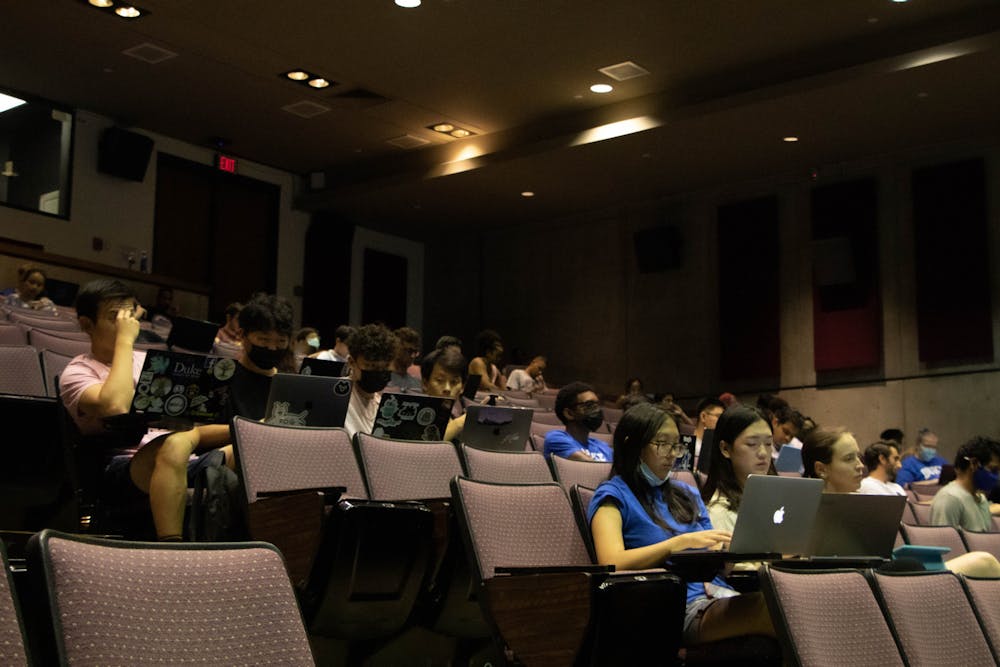While the number of COVID-19 cases in Durham has declined since the county entered a “high risk” category at the start of the semester, some professors have chosen to take precaution with individualized masking policies for their classrooms.
Duke lifted its classroom mask mandate in September 2022. As local cases rose in January, Duke said the mandate could return if levels remained high. Duke ultimately did not return to a mandate, though faculty members can still request that students wear masks in their classrooms.
Nicki Washington, professor of the practice of computer science, teaches 110 students in her Race, Gender, Class & Computing course and holds a required mask policy for everyone in the classroom. Personal health and the health of Washington’s loved ones were the factors that drove this decision.
“I am around my elderly mother and we have been extremely diligent about masking everywhere since March 2020, not eating indoors, etc. Plenty of people who discuss the impact that long COVID has had on their ability to live and work note how debilitating it can be. We have thankfully not been exposed to COVID yet, and I'd like to keep it that way as long as possible,” Washington wrote in an email.
Beyond health considerations, the decision for required masking in the classroom further emphasizes Washington’s course theme of learning about how identity is shaped by and impacts computing. According to Washington, people often overlook ability as a social identifier “unless they or someone close to them has a disability.” The topics taught in the course are designed to guide students to be able to “create more equitable and inclusive academic and professional spaces for people of all identities.”
“I noted to the students that we do not know who among us is immunocompromised, and every student enrolled at this university deserves the right to safely attend this course. As such, we will make sure that we are not only learning about equity and inclusion, but also demonstrating it from the first day by masking,” Washington wrote.
While masks in the classroom may serve as a learning obstacle for students who have issues with hearing or rely on reading lips, Washington addresses these concerns to ensure accessibility for all her students through recording lectures, using a microphone, repeating student responses to the class and adding subtitles to all presentation slides.
Professor of history Thomas Robisheaux follows University policy of optional masking, but asks that students with flu-like symptoms or those who are unsure of their COVID-19 status wear a mask out of courtesy for their classmates.
Robisheaux’s teaching style is very interactive, requiring active discussion in team-based learning exercises. In Robisheaux’s experience, masking diminishes class participation and inhibits critical interactions with students to further their learning.
“Masks inhibit learning and my getting to know a student. When I don’t know a student well and they are not as comfortable with me that ultimately inhibits the learning process. I can engage students more effectively without masks,” Robisheaux said.
Sarah Gaither, assistant professor of psychology and neuroscience, teaches 100 students in Introduction to Social Psychology. Despite having an optional masking policy for students, Gaither wears a mask while teaching to protect the health of her young children and to be “in solidarity with other students wanting to wear masks for whatever reason that may be.”
Similar to Washington, Gaither bases her masking policy on a central theme of her course, social conformity, which strongly influences individual behavior. Seeing many people without a mask may make an individual “second guess [their] own individual choice to wear a mask to protect [oneself].”
“I hope as the instructor, my choice helps make others feel more comfortable with their choice. No one should feel pressured to overlook their own health and we do not know everyone's personal situations,” Gaither wrote in an email.
Get The Chronicle straight to your inbox
Signup for our weekly newsletter. Cancel at any time.
Amy Guan is a Pratt senior and a senior editor of The Chronicle's 119th volume.

